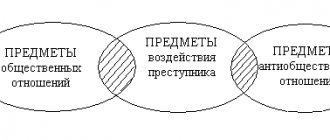Motive and purpose of committing a crime
The motive for a crime is the internal motivations determined by certain needs and interests that give rise to a person’s intention to commit a crime and by which he was guided in committing it.
The purpose of a crime is a mental model of the future result that a person strives to achieve when committing a crime.
The motive and purpose of committing a crime can have different criminal legal meanings:
- can turn into mandatory (as part of a specific crime);
- can act as qualifying characteristics;
- may act as circumstances that, without changing qualifications, mitigate or aggravate criminal liability.
Firstly , they can become mandatory if the legislator introduces them into a specific crime as a necessary condition for criminal liability. Thus, the motive of selfish or other personal interest is a mandatory sign of the subjective side of abuse of official powers (Article 285 of the Criminal Code of the Russian Federation), and the goal of taking possession of someone else’s property is a mandatory sign of piracy (Article 227 of the Criminal Code of the Russian Federation).
Secondly , motive and purpose can act as qualifying features. For example, kidnapping a person for mercenary reasons increases the degree of public danger of this crime, and the law considers it as a qualified type (clause “h” of Part 2 of Article 126 of the Criminal Code of the Russian Federation). Evasion of a military serviceman from military service by feigning illness or other means constitutes a qualified type of this crime if it is committed for the purpose of complete exemption from military service duties (Part 2 of Article 339 of the Criminal Code of the Russian Federation).
Thirdly , the motive and purpose of committing a crime can serve as circumstances that, without changing the qualifications, mitigate or aggravate criminal liability, if they are not indicated by the legislator when describing the main elements of the crime and are not provided as qualifying features. Thus, the commission of a crime motivated by national, racial, religious hatred or enmity, out of revenge for the lawful actions of other persons, is considered as an aggravating circumstance (clause “e” of Part 1 of Article 63 of the Criminal Code of the Russian Federation) and increases the punishment for any crime. On the contrary, committing a crime motivated by compassion for the victim (clause "d" part 1 of article 61 of the Criminal Code of the Russian Federation) or for the purpose of detaining the person who committed the crime, although in violation of the conditions of legality of necessary defense (clause "g" part 1 Article 61 of the Criminal Code of the Russian Federation) is recognized as a circumstance mitigating liability for any crime.
Motive for the crime
are called internal motivations conditioned by certain needs and interests that arouse a person’s intention to commit a crime and by which he was guided when committing it.
Purpose of the crime
is a mental model of the future result that a person strives to achieve when committing a crime.
Motive and purpose may have different criminal legal meanings:
· can become mandatory (as part of a specific crime);
· can act as qualifying features;
· may act as circumstances that, without changing qualifications, mitigate or aggravate criminal liability.
Firstly, they can become mandatory if the legislator introduces them into a specific crime as a necessary condition for criminal liability. Thus, the motive of selfish or other personal interest is a mandatory sign of the subjective side of abuse of official powers (Article 285 of the Criminal Code of the Russian Federation), and the goal of taking possession of someone else’s property is a mandatory sign of piracy (Article 227 of the Criminal Code of the Russian Federation).
Secondly, motive and purpose can act as qualifying features. For example, kidnapping a person for mercenary reasons increases the degree of public danger of this crime, and the law considers it as a qualified type (clause “h” of Part 2 of Article 126 of the Criminal Code of the Russian Federation). Evasion of a military serviceman from military service by feigning illness or other means constitutes a qualified type of this crime if it is committed for the purpose of complete exemption from military service duties (Part 2 of Article 339 of the Criminal Code of the Russian Federation).
Thirdly, motive and purpose can serve as circumstances that, without changing the qualifications, mitigate or aggravate criminal liability, if they are not indicated by the legislator when describing the main elements of the crime and are not provided as qualifying characteristics. Thus, the commission of a crime motivated by national, racial, religious hatred or enmity, out of revenge for the lawful actions of other persons, is considered as an aggravating circumstance (clause “e” of Part 1 of Article 63 of the Criminal Code of the Russian Federation) and increases the punishment for any crime. On the contrary, committing a crime motivated by compassion for the victim (clause "d" part 1 of article 61 of the Criminal Code of the Russian Federation) or for the purpose of detaining the person who committed the crime, although in violation of the conditions of legality of necessary defense (clause "g" part 1 Article 61 of the Criminal Code of the Russian Federation) is recognized as a circumstance mitigating liability for any crime.
0
1.5
Subject, object and motive
In accordance with the legislation of the Russian Federation, the subject of a crime is considered to be an individual who has committed an unlawful, socially dangerous act, who is sane and capable of bearing the punishment provided for by the Criminal Code for his unlawful actions. The subjects of the crime are the performer who committed actions within the framework of its objective side, an accomplice playing the role of organizer, instigator or accomplice, as well as persons whose criminal activity was interrupted at the stage of preparation or attempt.
“The criminal law establishes several minimum age limits for criminal liability: reduced - from 14 years, general - from 16 years, and from 18 years or more. The next aspect of the subject of a crime is his sanity, that is, a person’s ability, due to his mental state, to be aware of himself, to direct his actions and to perceive them correctly. At the same time, Article 22 of the Criminal Code of the Russian Federation provides for criminal liability of persons who, at the time of committing a crime, due to a mental disorder, could not fully understand the actual nature and social danger of their actions or control them. In practice, this circumstance is referred to as limited sanity. According to Article 23 of the Criminal Code of the Russian Federation, a person who commits a crime while intoxicated (using alcohol, narcotic drugs or other psychotropic substances) is subject to criminal liability,” explains criminal lawyer Vladimir Panfilov.
The legislator identifies three special characteristics of the subject: the first, based on the type of occupation. Special subjects also include persons whose duties by virtue of their profession include performing certain actions.
The second group has characteristics based on gender (Article 131 of the Criminal Code), age (Articles 134, 135, 150, 151 of the Criminal Code), the presence of a sexually transmitted disease (Article 121 of the Criminal Code) or HIV infection (Article 122 of the Criminal Code), state of passion (Article 107, 113 of the Criminal Code), the presence of an outstanding criminal record, and others.
The properties of the third group are determined by the attitude of the perpetrator to the victim; there is his social status: parent, teacher, other person entrusted with the responsibility of raising a minor; a person who evades payment of funds for the maintenance of disabled parents; the person to whom the property of the victim is entrusted; a person who has a duty of care to someone who is in danger and helpless.
“Let's consider the remaining one - the fourth sign of the crime, its subjective side. The subjective side of a crime is a mental construct in the mind of the subject of the crime, we emphasize that it is in the mind of the person who committed the crime that determines his attitude towards the committed socially dangerous act (the objective side of the crime and the object of the crime), determined by guilt, motive, purpose and emotions,” - says criminal lawyer Vladimir Panfilov.
Guilt, being a psychological category, acts in a two-component capacity in the form of intent and negligence. In turn, intent can be direct when the subject of the crime is aware of the social danger of his actions (inaction), foresees the possibility or inevitability of socially dangerous consequences and desires their occurrence. And the second aspect is indirect intent, when the subject is aware of the social danger of his actions (inaction), foresees the possibility of socially dangerous consequences, does not want, but consciously allows these consequences or is indifferent to them.
Carelessness is covered by categories such as thoughtlessness or negligence. A crime is recognized as committed through frivolity if the subject foresaw the possibility of socially dangerous consequences of his actions (inaction), but without sufficient grounds for this he arrogantly counted on preventing these consequences.
“A crime is recognized as committed through negligence if the subject did not foresee the possibility of socially dangerous consequences of his actions (inaction), although with the necessary care and forethought he should and could have foreseen these consequences. Optional or additional signs of guilt are: motive - as an incentive that causes the determination to commit a crime; the purpose of the crime - as an idea of the desired result that the subject committing the crime strives to achieve; emotional state - as an internal background in which the intellectual and volitional qualities of the psyche of a subject committing a socially dangerous act are manifested,” says criminal lawyer Vladimir Panfilov.
The subjective side is the most important element of the crime. Accurate identification of all its signs is a necessary condition for the correct classification of a socially dangerous act. allows you to distinguish between crimes that are similar in objective terms. Analysis of the subjective side in the process of defending the accused allows us to clearly separate a socially dangerous act entailing criminal liability from non-criminal behavior, although such an action caused harm to protected social relations, determines the degree of social danger of the crime, which affects the differentiation and individualization of punishment.
“Our goal is to acquaint the reader with the design features of the concept of crime in Russian legislation. Show its signs individually and collectively. Determine the legal nature on which the criminal prosecution process is based. At the same time, the absence of one, part or group of elements of a crime identified by the defense at any stage of the criminal process leads to the release of a person (suspect, accused, defendant, and in some cases in the cassation or supervisory authorities and convicted person) from criminal prosecution,” I am sure criminal lawyer Vladimir Panfilov.
The concept and meaning of the motive of the crime
What is motive in criminal law? In this context, motive is an incentive to action
It, like the guilt described above, is an important component of the subjective side of the violation of law. Correct recognition of its essence has implications for legal liability
The motive allows you to reveal the true essence of the reasons that prompted you to commit a criminal act. Correctly establishing a motive sometimes causes a sharp change in the legal assessment of the crime committed. There are the following types of motives in criminal law:
- negative, characterized by antisocial connotations. This may include malice, self-interest, revenge, etc. Such a motive is an aggravating circumstance;
- indifferent, characterized by a state of apathy and boredom. Most often, such a motive is inherent in crimes expressed in inaction;
- positive, characterized by altruism and kindness. Such motives do not abolish criminal liability, but mitigate it. An example of an offense with such a motive would be euthanasia. On the one hand, the offender wanted to do what was best, but still committed murder.
Any violation of the rules established in society, including at the legislative level, has a motive. But in some cases, the true motive is very difficult to establish, because the offender may deliberately hide it for various reasons.
Motive of crime concept and meaning
In this interpretation, motivation is an incentive, a reason for some action. At the heart of a person’s varied lifestyle are some incentives that determine the social calculation and target direction. The significance of motives in human behavior is diverse. First of all, it has an incentive role; the subject’s activity increases and actions are stimulated.
But even real circumstances do not determine the unambiguity of the subject’s actions; they are always purposeful and selective. A citizen independently chooses actions in accordance with circumstances, personal intentions, and inclinations.
An important component of the subjective side of a legal violation in a jurisdiction is the motive for a socially dangerous action. Correctly recognizing its essence as a qualifying mark is of the most important theoretical and practical importance for legal liability. Reason is a psychological concept that reveals the inner nature of human actions, their nature.
General psychology connects it with the needs of the person:
- primary (natural);
- secondary (material, spiritual).
The motive reveals the true content of a socially dangerous act. It characterizes a socially dangerous act and the personal data of the offender. A correctly established specific basis sometimes dramatically changes the legal assessment of the crime committed.
The motive for offending behavior includes association:
- reasons;
- motivational factors;
- inner beliefs.
Causing a desire in the subject to satisfy them with the help of a criminal act. A need closely related to a person’s upbringing, nature, and moral qualities.
Types of motives in Russian criminal law, their classification is taken from scientific psychology. They are attached to criminology:
- Negative motive. Characterized by an antisocial, base coloring: selfishness, anger, self-interest, revenge, hatred, envy. They almost always involve aggravating circumstances.
- Neutral motive. Characterized by unemployment, a state of apathy, boredom.
- Positive motive. It is interconnected with altruism and kindness, but this does not mean the exclusion of criminal liability, but they can mitigate the punishment. An example is a specific positive motive – euthanasia. A patient who was deprived of his life by a nurse with humane motives, who succumbed to the requests of the doomed man to help him die painlessly. Yes, a criminal act was committed, even though he had good intentions.
Motives are inherent in any legal violation. The science of jurisprudence does not consider the essential significance of what formed the basis of the committed acts, what psychological aspects are involved in it.
Psychological motives, moments:
- need;
- interest;
- wish;
- aspiration;
- value setting.
In the course of qualification, acts can easily act as a motive for a legal violation. For example, jealousy is noted by psychologists as a feeling; according to legal laws, when a murder is carried out on its basis, it is considered the basis of a criminal act.
The motives for an offense include an internal drive to achieve certain socially threatening results that make the subject decide to commit an offense.







